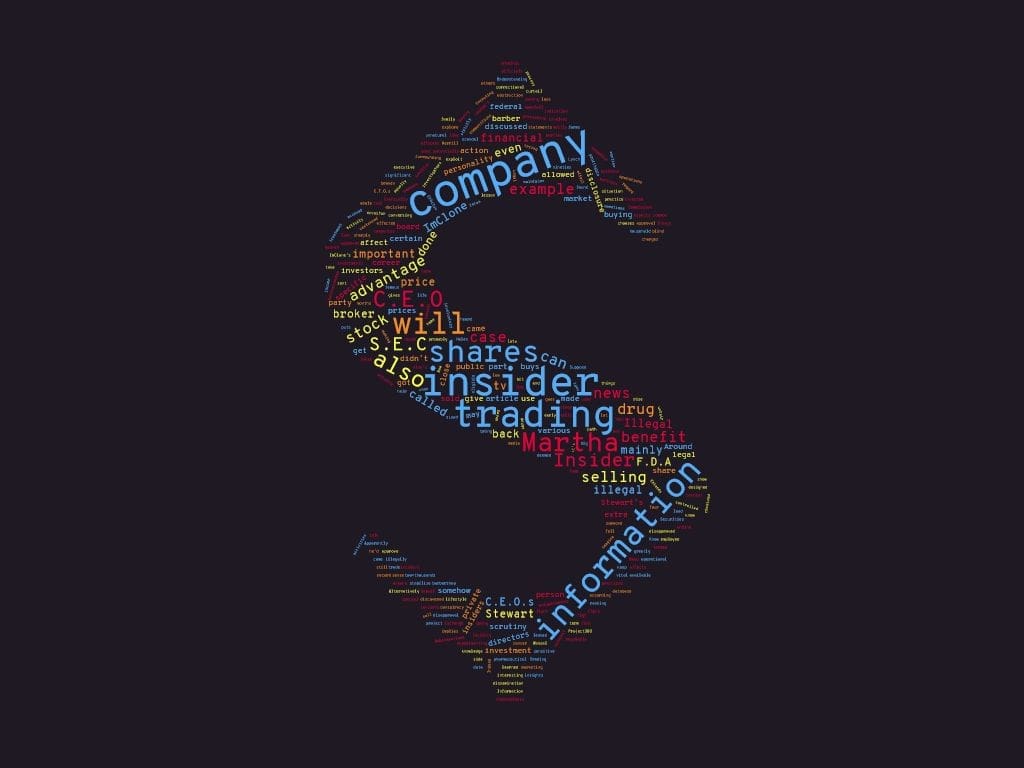
In investment marketing, knowledge about the company you are investing in is equally as important as the price of the stock you invested in because information like this could end up saving a lot more for you than you could imagine.
Insider trading mostly concerns important information surrounding the company of interest. The term “insider” mainly implies a person who has information about the company. Alternatively, if a person has 10% or more shares in a company, he’d be called a company insider too. In that sense, all of the company board of directors and C.E.O.s and high ranking officials are all insiders.
An insider trade involves an insider selling his or her shares. Information vital to the business of the company and if dissemination of the information could somehow affect the company, it’s also called insider trading.
Insider trading is strictly controlled by the Securities and Exchange Commission, or S.E.C. so that the company couldn’t take advantage of insider trading. In this article, we will talk about various aspects of insider trading and what portions, if at all, conflict with the law.
Understanding the concept
S.E.C. maintains certain laws and practices to keep insider trading under scrutiny. Because, according to them, such private information about the company could give an unfair market advantage to some party that will use this information to benefit his or her case.
Indeed, sensitive information about a company could benefit its investors greatly, as we discussed before. Such information could lead them towards a more profitable path. Now, if other investors are blind to it, then the investor with such information will have gained an advantage over them. Even if he has broken even on his investment, it is still illegal because others have accrued a loss, and he received special treatment. Check out extra income with Project303 from Nobsimreviews for more financial project insights.
Legal insider trading
Some forms of insider trading are allowed as we discussed earlier under the scrutiny of S.E.C. An insider is allowed to buy or sell shares. But S.E.C. will record this whole process. This data will be available online in a specific database.
Such insider trading operations are done regularly. A fine example is when a C.E.O. buys back public shares of a company as a part of the operational activities, or when a company employee buys a company shares.
The C.E.O. buying a company share could give some indication about the company. Such activity affects the price of the share of the company. Buying back shares may show that the C.E.O. is trying to curtail a big fall in price. A C.E.O. selling shares could have some significant effect too. We will explore a case in this regard later in this article.
Illegal insider trading
This is the side of insider trading we know. Illegal insider trading is more common. Insider tradings are mainly done to benefit a specific party, be it the stakeholders or the company men or even the insiders themselves.
Illegal insider trading can be termed as unnatural disclosure of nonpublic company information. Such disclosure can come from anyone in the company, such as the board of directors, C.E.O.s, C.T.O.s, other executive officers. It could also be their close ones, such as family members, friends, even their close acquaintances.
An example could clear things up a bit. Suppose a company C.E.O. goes to a barbershop to get his hair fixed. While conversing, he somehow tells the barber some company information that is not public. The information can also be used to exploit the company shares.
If the barber chooses to use this information to his or someone else’s benefit, then this action will be deemed illegal, and he will be eligible for legal action by the S.E.C. This is an example of involuntary insider trading.
A case of illegal insider trading
If you had an affinity for tv in the late nineties or early two-thousands, you probably have heard of Martha Helen Stewart. A household name back then, what didn’t Martha do on tv! She was mainly a lifestyle media personality and a businesswoman. She had made investments in various companies. One of them was ImClone, a pharmaceutical company that also would bring her downfall.
Around 2001, ImClone was experimenting with a drug called Erbitux, a drug designed to fight cancer. They sent it to F.D.A. for approval. Eventually, F.D.A. didn’t approve of the drug. As soon as this news came out, ImClone’s stock prices fell very sharply.
The interesting part here was, sometimes before the drug got disapproved, Martha Stewart had sold all of her shares in the market. Apparently, Stewart got the news that the drugs were not going to get approved by her broker at Merrill Lynch. The news came to the broker, from the C.E.O. of ImClone, Samuel Waksal, who also had sold all of his shares before the disapproval by the F.D.A. The news of him selling his shares was private company information, but it was leaked to Martha Stewart’s broker.
Around 2003, this insider trading of information was discovered. It was found that Martha had made over $45,000 from this insider trading. In 2004, Martha was sentenced to four months in a federal correctional facility on the charges of obstruction of a proceeding, conspiracy, and making false statements to federal investigators. This affected her career as a tv personality as she would never rise to the fame she had before this financial scandal.
This is a famous case of insider trading. It is also an example of how C.E.O.s buying or selling decisions of the company stock may affect the stock prices.
Insider trading as a legal practice could be very important to stabilize a company and its financial situation. If done illegally, it gives certain parties some extra advantage that puts them ahead of their competitions. A lesson can be learned from Martha Stewart’s incident, as to how such insider trading could potentially harm your career and life.

Be the first to comment